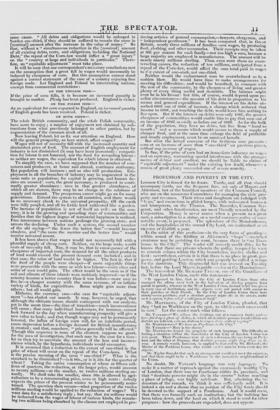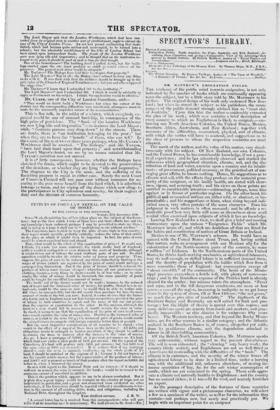PROFUSION AND POVERTY IN THE CITY.
LONDON City is filmed for its feasts. Turtle, and all that should accompany turtle, are the frequent litre, sot only of Mayors and Aldermen, but of the humblest members of the Common Council, who are OH the numerous Committees for managing the civic pro- perty and revenues. Their wives and daughters are indulged with " hops," and excursions in gilded barges, with red-coated boatmen and trumpeters, on the Thames. The Recorder, Common Ser- geant, and other finictionaries, are most liberally rewarded by the Corporation. Money is never scarce when a present to a great man, a subscription to a statue, or a medal cominemorative of some notable event, is proposed. The splendour of the Mansionhouse, and the hospitalities of the annual City Lord, are maintained at an expense of 25,000/. a year.
In the midst of this profusion—in the very focus of guzzling-- within sound of the fiddling at Aldermen's "hops"--wretched creatures may be perishing for want, because there is " no Poor- house in the City." The reader will scarcely credit this ; for he knows that there are prisons wherein the guilty, tempted by want to commit crimes within the City boundaries, receive shelter and food : nevertheless, certain it is that there is no place in great, gor- geous, and guttling London, which can properly be called a refuge for the destitute. This disgraceful tact was avowed on Tuesday last, before the Lord Mayor, in public iesion at the Mansionbouse. The benevolent Mr. IlicuAan TAvi.ott, one of the Guardians of the West London Union, made this statement-
" It appeared to him, that in the City of London 'Union those who managed the affairs went back to the barbarism of driving paupers from parish to parish; whereas in the West London Union, instant relief was given in every case of destitution, and the objects were not parted with except to their parishes or their 'blends. In the City of London Union there were ninety-seven parishes; and a destitute person might the in the streets, under such « system, leAre relhf wrath! present itself."
Mr. MATTHEWS, of the City of London Union, pleaded, that they "had no Workhouse on the spot, to which casual cases could be sent." Let the reader mark what follows.
Mr. TAYLOE---" We relieve the destitute out of a common fluid ; and lee hare jilted up a place of shelter, h. which all destitute persons found within our district are relieved, extreme distress heeing a claim without iarpiira," 3Ir. MATTTIEWS—" ire IWIT 210 Poorhouse in the City."
Mr. TAYLOR—" More is the shame."
Mr. MATTnEws denied the propriety of such language. • The difficulty of finding a situation within the boundaries of the City of London Union was
very great. Their Poorhouses were at such a distance, the one being at Peck- ham and the other at Stepney, that destitute persons nilyht dr‘p dwell on the way. A remedy, would, however, be applied to that evil by Mr. Richards., the Master of the Peckham house, who would seed a num to town every day for objects.
Mr. Taylor thought that such an arnmgement would not meet the exigency, and that there ought to be a Workhouse in the immediate neighbourhood of the Union.
No doubt, Mr. TAY ion's language was very improper. To inake it a matter of reproach against the enormously wealthy City of London, that there was no Poorhouse within its precincts, and that "destitute persons might die in the streets" before reaching a place of refuge, was highly indelicate. But, admitting the in- decorum of the remark, we think it was sufficiently mild. It is indeed a sin and a shame that no portion of the City funds should be devoted to the support of a Poorhouse. And it would seem, that there was formerly such an institution; but the building has been taken down, and the land on which it stood is used for other purposes : how the proceeds are expended, does not appear.
The Lord Mayor • said that the London Workhouse, which had been con- verted from its original state to another sort of ettablishment, aught to attract the -eyes of the-City of London Union. An act had passed authorizing that insti,- lotion, which had become quite useless and unoccupied, to be turned into a school; but the admirable establishment of the City of London school had been raised upon independent funds. The finals o'f the Lombm Workhouse were now •Iying Idle and inoperative; and he thong/it that as. the institution be- longed to the poor, it should be used at suc,h 0 time fin their benefit. •
One of the Guardians--" The building. itself is pulled down, but the build- ings erected upon the site must produce as much as would answer' all the purposes. The ground-rent alone would be adequate."
Mr. Taylor—" The Bishops have laid their !n-ad upon that pro,nerty." • The Lord Mayor—" Not, at all : the Bishops have refhsed to have any thing to do with it. It was their wish that the children should be brought up in the principles of the Church of England Establishmeitt ; hut you and Miters opposed the suggestion." Mr. Taylor—" I know that I subscribed 50/. to the institution," - The Lord Mayor—" And I subscribed 30/. 1 think it would he advisable to .apply to Thudialoott on the subject. I think the application would be effective."
• Mr. CLARK, one of the City of London Guardians, said- . " They would no doubt build a Workhouse; hut when the extent of the district 'and the corresponding difficulties were considered, allowances must be made for the necessarily imperfect nature of the accommodation."
• This is fine talk, in the midst of a winter, which everybody ex- peeled would be one of unusual hardship, in consequence of the high price of' provisions. The " funds of the London Workhouse are now lying idle and inoperative "—so declares the Lord Mayor ; while "destitute persons may drop down" in the streets. There are funds, there is "an institution belonging to the poor ;" but whcn they are to have the "benefit" of them, .who can tell ? In the course of the next two or three years perhaps, when Mr. CLARK'S Workhouse shall be erected. "The Bishops," said Mr. TAYLOR, "lave laid their hand upon that property ;" and notwithstanding the Lord Mayor's denial, we are by no MMUS satisfied that Mr. -TAvroa's assertion was not correct. It is of little consequence, however, whether the Bishops have clutched the funds, which ought to be devoted to the preservation of the destitute, or whether they are lying "idle and inoperative." The disgrace to the City is the same, and the suffering of the famishing paupers is equal in either case. Surely the next Court of Common Council will net pass over without 'measures thr se- curing to the poor sonic benefit from the fund which, it is admitted, belongs to them, and for wiping off the shame which now clings to the participators in City splendour and revelry, for their neglect of duty and the dietates.of common humanity.
































 Previous page
Previous page